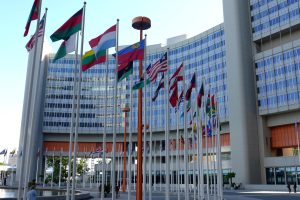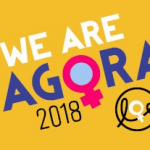Gender equality can’t be achieved by the UN Agenda 2030 due to a lack of feminist policymaking. The UN Sustainable Development Goals fail to address or even recognize systemic inequalities and other structural issues, such as power relations in general and the global growth-centric, capitalist economic model, to the detriment of women’s empowerment.
In 2015, the United Nations released a set of Sustainable Development Goals (SDGs) focusing on the areas of climate, gender, health, urbanization, and the economy. Goal 5 is to “Achieve gender equality and empower all women and girls”. Gender is mentioned throughout the document, in an attempt to recognize its all-encompassing, cross-cutting and intersectional nature and the gendered impacts of environmental, social, and economic concerns.
Nevertheless, the SDGs fail to identify and in turn challenge the more systemic issues and obstacles women and girls face within the existing economic and social structures in which gender inequalities are often rooted. Instead, the SDGs promote change only within the traditional structures for development and economics, which will, in the long term, continue to perpetuate inequality. Feminist policymaking could have prevented that.
The SDGs do not present a transformative approach that addresses existing, and growing, inequalities between genders
A variety of women’s rights groups were involved in the SDGs’ conception, such as the Women’s Major Group (WMG) and its affiliates. Input from these groups was incorporated throughout the entire process in the form of stock-taking, negotiations and their participation in the Open Working Group on Sustainable Development Goals (SDGs). This resulted in a broad scope of targets under Goal 5, amongst which are the elimination of all forms of violence and discrimination against women in several areas such as marriage, participation in the workforce and the economy – but there are many issues with this.
A holistic, feminist perspective is crucial
Feminist policymaking in international development encompasses feminist perspectives, it recognises and addresses the interwoven structural issues of the patriarchy, neo-liberalist capitalism, imperialism and racism as drivers of inequality and environmental destruction. The SDGs lack this holistic, feminist perspective. They promote the idea that economic growth and gender equality are directly linked as is clear from Goal 5’s notion of economic empowerment. They do not truly challenge or question the current growth-centric economic development model. This demonstrates that the current (supposed) neutrality of the policymaking process cannot properly address inequalities, and showcases that these issues must be tackled from a gender and intersectional perspective, through feminist policymaking.
The SDGs do not present a transformative approach that addresses existing, and growing, inequalities between genders, since they uphold social models that are patriarchal at their core. An example of this is the failure to ensure the effective protection, fulfilment and respect of sexual and reproductive health and rights (SRHR) for all. Likewise, they don’t question, much less oppose, the current capitalist macroeconomic model that perpetuates disparities between, for instance, the global North and the global South. Without overcoming unequal power relations in the SDGs’s creation, I believe they are doomed to fail in their implementation.
With regards to economic empowerment, Goal 5 inserts women in traditional economic models which are at the core of many gender-based economic inequalities and does not deal sufficiently with the over-representation of women in informal, unpaid work. I find it a neoliberal project that privileges capital to the detriment of informal labour, which is largely performed by women and girls, thus rendering it invisible.
Besides, true feminist policymaking would have understood that gender equality must go way beyond equality of economic opportunity between women and men. For example, the redistribution of resources, and recognising reproductive and sexual health and rights in their entirety, is necessary for a full realisation of the empowerment agenda.
Power structures are a choice
Goal 5 provides an inadequate framework for recognizing dynamics and hierarchies of gender, class or levels of development. The SDG agenda does not try to challenge power relations between men and women, and I would argue that it is exceedingly difficult, if not impossible, to enact effective change without substantial reform of the power structures in place, as framed by bell hooks, the white supremacist capitalist patriarchy.
The SDGs’s approach assumes power as certain, rather than as a choice of governance and social order. Instead, we need an approach that acknowledges the role of women and girls as agents of change, thereby understanding the deeply unequal power relations currently in existence, which create structural obstacles that perpetuate gender inequality. It is important to recognise that women and girls are not inherently vulnerable, they are simply disadvantaged by unequal gender power relations. There is a substantial amount of research suggesting that focusing only on the immediate problems of individual women and girls will fail if power relations are not transformed.
[…] addressing systemic inequality and structural hurdles is essential to continue progressing. This can only be achieved through feminist policymaking.
For example, the way Goal 5 encourages women’s political participation, as it equates political empowerment with ‘sitting women at the table’, is labouring under a flawed assumption that greater (numerical) political presence of women will automatically benefit all women, when in truth this does not necessarily equate to substantive representation.
Furthermore, women’s full participation is not only dependent on women’s own will, but also on access to the resources and on the existence of concrete mechanisms that promote and protect women’s participation. Goal 5 is vague when it comes to concrete mechanisms for eliminating the impediments that keep women from political participation from the outset.
The future of the SDGs and feminist policymaking
UN Women has done an analysis and critique of SDG 5 which re-emphasized that addressing systemic inequality and structural hurdles is essential to continue progressing. This can only be achieved through feminist policymaking. Concepts such as ecofeminism and climate justice must be incorporated within the SDGs, in order to establish relevant operational definitions for implementing policies. Likewise, development policies cannot continue to be silent or inadequately and weakly formulated on LGBTQ+ issues. Any discussion around gender, moreover, needs to engage with nonconforming gender expression and masculinities, namely by understanding and addressing the impacts of various issues on men, as well as women.
Albeit the SDG Agenda includes the stand-alone goal on gender equality and women’s rights and empowerment that feminists struggled hard for, it is a watered-down version of feminist demands. While the degree and effects of the implementation of the UN’s Agenda 2030 is still unknown, I sadly find it doomed to fail from the outset.
So how can policymaking become feminist? The answer is simple: Member States must ensure more meaningful representation of women and civil society stakeholders, and directly resource women’s rights groups and assure accountability, transparency and responsibility of all actors. In the meantime, the lives and bodies of women and girls will continue to be subjected to national political agendas, where laws are not always made to ensure our rights.




![Reproductive rights in Latvia: What sets alarm bells ringing for feminists – Reproduktīvās tiesības Latvijā: kas liek feministēm uztraukties [EN/LV]](https://www.youngfeminist.eu/wp-content/uploads/2015/12/reproductive-rights1-150x150.png)

Average Rating